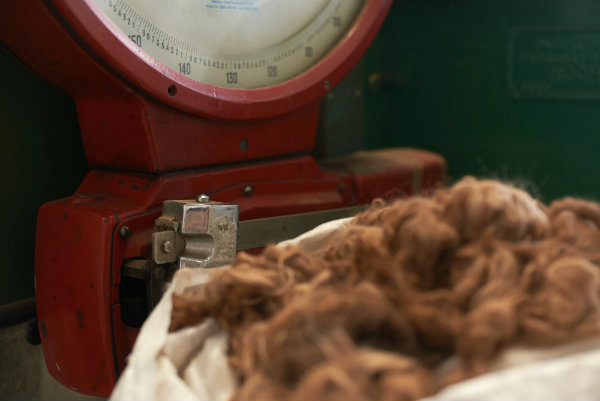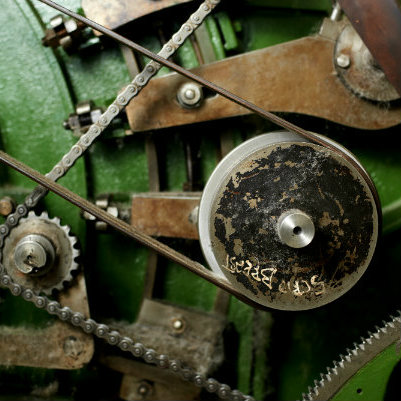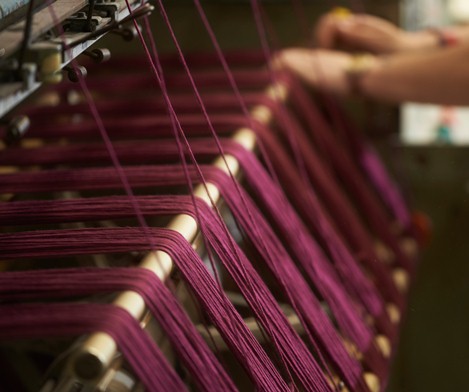Earlier in Wovember Louise spoke to Joy McMillan, from The Knitting Goddess about her plans to design a 100% Yorkshire wool yarn. In conversation with Louise and Joy was Claire Tunney, of Fourways Dorsets, whose fleece was going into the yarn. You can listen to their interview here.
An important part of the process of creating this yarn will happen at the Natural Fibre Company and we thought it would be a really fascinating insight to ask Lara Pollard Jones, Commissioning Manager at NFC, to tell us a bit about her job and the work that goes into creating yarn at the Cornwall mill.
One of the fantastic things about working in a woollen mill is that no two days are the same. At the Natural Fibre Company we work with a wide variety of different breeds from the Alpines Steinschaf to the Zwartbles and everything in between. We specialise in small-batch processing. This means that we not only work with a large variety of breeds from all over the country (and world), but we also get to meet the shepherds who care for these flocks too.
What I should be really clear on, is that when I say ‘we’ I’m referring to everyone who works here. We aren’t a massive company; there are less than 20 of us of which nine work in the mill. At every stage of processing work is signed off by the individual that completed it and for those who really like to go in depth, we can tell you exactly who worked on your order and when. Whether we’re in the mill or the office, we get to know our customers and (depending on who you ask) can recall previous orders and specifications – the long winter nights just fly by! This means that we can build on previous years’ experience and learn how each customer’s fibre runs, and make the necessary changes to the machinery to ensure a quality product is produced. It also puts us in a good position to offer advice when a customer is looking for a new complementary product, or to add a slight twist to what they currently produce.
Each customer and their flock is unique and though there may be many people keeping the same breed, their sheep will always be different to the next persons. This means that every order we make is a custom order. My job is to work with customers to help develop a product that is right for them and then to pass on this information to the mill.

One of the most important steps is to suss out the base fibre. This can be anything from the softest merino through to the hardiest Herdwick. It is vital to make sure our customers know what is possible with their fibre as some breeds are more suited towards certain projects than others. For example, you wouldn’t knit baby clothes out of Herdwick, nor would you want to make carpet yarn out of very soft non-durable fibre. Sometimes the base yarn is a blend of naturally coloured or white fleeces as supplied by the customer; other times we blend in a percentage of a different colour in order to achieve a base colour.
The final use of the yarn is important; if it is going for weaving I speak with the weavers to make sure we are spinning to the specification that they work with. Weavers will use different yarn weights and levels of twist for different projects so we need to make sure that the yarn is right for them. If the yarn is going for knitting then it is often presented in a format that is attractive to customers; sometimes balls, sometimes twisted skeins. Most often we design and apply bands on balls and skeins with our customer’s details or brand identity on them.

Not all of our customers have their own fibre, and sometimes I get requests to design a yarn that will be a new feature in somebody’s range, or that has certain attributes. In the past, I’ve come up with fibre blends for hand-dyers, which give them a balance of sheen and softness as well as a subtly coloured base to put their dyes over, as well as a blend of specific British fibres for larger knitwear companies.

Traceability is something that comes up a lot especially from those who don’t have sheep, but want to be able to pinpoint the exact farm that the fibre originated from. I’ve sourced specific breeds from specific areas, for example, Llanwenog from the parish of Llanwenog and Poll Dorset from Dorset, as well as fibre from a certain radius of a customer’s address. This is part of the job that can be challenging at times, especially later in the year when everyone has sent their clips of for processing or sold to the British Wool Marketing Board. However, The Natural Fibre Company has a large number of customers and suppliers throughout the country and most breeds can be found quite readily. Our suppliers range in size from a shepherd with a handful of sheep to larger commercial flocks.

As we spin our own Blacker Yarns ranges, we have some farmers that we buy fleece from every year, because we know we can get the quality we need from certain flocks. In fact, there are some customers who we process for annually, whose fibre will always come from the same place because we know how well it performs when spun and also how well it works for the customer.
Lara Pollard-Jones works for Sue Blacker at The Natural Fibre Company in Cornwall. Not being content with just working with wool she also has a flock of pedigree Ryeland Sheep (with a couple of Blue-Faced Leicesters and Bowmonts thrown in for good measure).
Thank you so much Lara. Images belong to Sam Morgan Moore, at The Natural Fibre Company, unless otherwise stated. For news of when The Knitting Goddess Yorkshire Yarn is hot off the spinners in Cornwall, sign up to Joy’s newsletter.